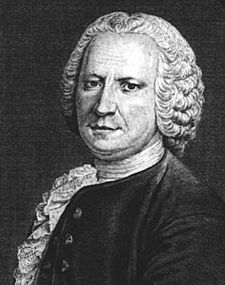Guillaume-François Rouelle facts for kids
Quick facts for kids
Guillaume-François Rouelle
|
|
|---|---|

Guillaume-François Rouelle
|
|
| Born | 15 September 1703 Mathieu, France
|
| Died | 3 August 1770 (aged 66) Paris, France
|
| Nationality | French |
| Known for | Base |
| Scientific career | |
| Fields | Chemistry |
| Influenced | Denis Diderot Antoine-Laurent de Lavoisier Joseph Proust Antoine-Augustin Parmentier |
Guillaume François Rouelle (pronounced Gee-yohm Frahn-swah Roo-el) was a famous French chemist and apothecary. He was born on September 15, 1703, and passed away on August 3, 1770.
In 1754, Rouelle introduced a very important idea to chemistry: the concept of a "base". He explained that a base is a substance that reacts with an acid to create a salt. This idea helped chemists understand how different chemicals combine.
Guillaume-François Rouelle is sometimes called l'Aîné (which means "the elder"). This helps tell him apart from his younger brother, Hilaire Rouelle, who was also a chemist. Hilaire is known for discovering urea.
Early Life and Teaching
Guillaume-François Rouelle began his career as an apothecary. An apothecary was like a pharmacist who also prepared medicines.
Later, in 1738, he started teaching chemistry to the public in his own laboratory. He became very popular as a teacher. In 1742, he was chosen to be the experimental chemistry demonstrator at the Jardin du Roi (Royal Garden) in Paris.
Many famous students learned from him. These included important thinkers and scientists like Denis Diderot, Antoine-Laurent de Lavoisier, Joseph Proust, and Antoine-Augustin Parmentier. His teaching greatly influenced the next generation of chemists.
What is a Chemical Base?
Rouelle's most famous contribution was defining the term "base" in chemistry. Before him, chemists knew about acids and salts, but the idea of a "base" was not clearly defined.
He explained that a base is any substance that can combine with an acid to form a salt. He said that a base acts like a "foundation" for the salt. It gives the salt a solid or concrete form.
For example, he included substances like:
- Water-soluble alkalis (like sodium hydroxide)
- Volatile alkalis (like ammonia)
- Absorbent earths
- Metals
- Oils
All these could act as a "base" to create a salt when mixed with an acid. This new way of thinking helped chemists understand and classify many more types of salts.
Other Discoveries
Besides his work on bases and salts, Rouelle also studied other chemical reactions. He published papers on how turpentine and other essential oils could catch fire when mixed with nitric acid.
He also researched the ancient methods of embalming used in Ancient Egypt. This showed his wide range of interests in chemistry and history.
In 1749, he was elected as a foreign member of the Royal Swedish Academy of Sciences. This was a great honor, showing how respected he was in the scientific community.
See also
 In Spanish: Guillaume François Rouelle para niños
In Spanish: Guillaume François Rouelle para niños
 | Lonnie Johnson |
 | Granville Woods |
 | Lewis Howard Latimer |
 | James West |

